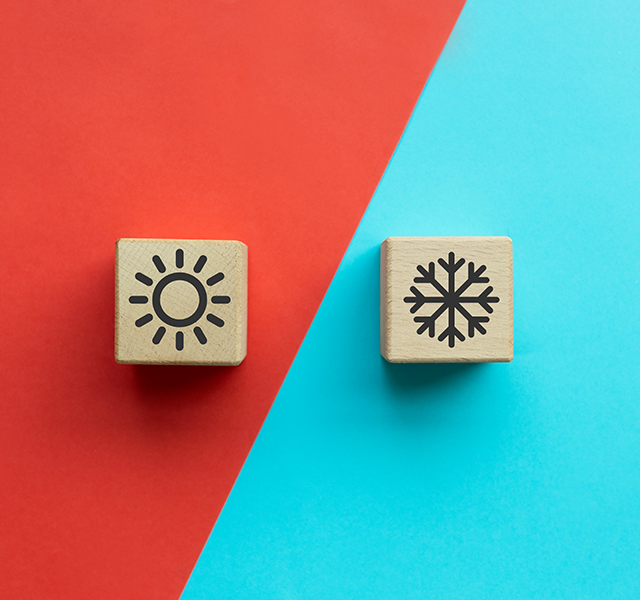You might know that cancer treatments like chemotherapy and radiation can cause side effects ranging from nausea and diarrhea to hair loss and neuropathy. But during the summer and winter, those with cancer may be particularly vulnerable to seasonal risks that could harm their health or intensify side effects of treatment, says Jenifer Olszewski, N.P., a nurse practitioner at Henry Ford Health.
Here, she shares what to watch out for during summer and winter – and how to enjoy these seasons while staying safe.
Summer Risks To Be Aware Of If You Have Cancer
1. Dehydration
One of the biggest risks people with cancer face during the warmer months is dehydration. During chemotherapy, the body enters a hypermetabolic state, meaning you burn calories faster than normal and so you have greater fluid needs. Couple this with being outdoors in the hot sun and dehydration could sneak up on you.
“I recommend asking your doctor the amount of fluids you should be drinking per day, especially if you’re spending time outdoors,” says Olszewski. “One of the side effects of chemotherapy is losing an appetite for foods and liquids, so it’s extra crucial to make sure you’re getting enough of both.”
Certain types of chemotherapy (along with other cancer treatments) affect the kidneys, so it’s also crucial to stay hydrated to avoid kidney damage. Signs of dehydration include: a decreased need to urinate, cracked lips and feeling weak, dizzy or fatigued. Dehydration can even cause heat stroke or worsen some of the symptoms of cancer treatment, such as vomiting, diarrhea and headache.
2. Sunburns
Certain chemotherapies, radiation treatments and targeted therapies increase the risk for skin toxicity when exposed to the sun and UV rays. “Radiation itself can cause irritation to the skin that looks similar to a sunburn, and going out into the sun can worsen it,” says Olszewski.
To protect yourself from harmful sun exposure, stay in the shade when you can and wear plenty of sunscreen with at least SPF 30, a wide-brimmed hat and lightly colored protective clothing.

Cancer Care At Henry Ford
3. Infections
From swimming in lakes to consuming food that has been sitting outside, summertime activities can cause various infections. “Many chemotherapies may weaken the immune system, so those who have cancer are especially vulnerable to developing infections,” says Olszewski.
To help prevent illnesses like food poisoning and bacterial infections from lakes, plan ahead by bringing your own food (and storing it properly). It’s also a good idea to bring a lawn chair, umbrella and a good book so you can comfortably lounge while friends and family swim.
Most importantly, listen to your body. If you’re not feeling right, or your symptoms worsen, go to the doctor. Many times, intravenous fluids for hydration are all you need to feel better. But if you get a foodborne illness or heat stroke caused by dehydration, medical professionals can get you the help you need to feel better.
Winter Risks To Be Aware Of If You Have Cancer
1. Worsened neuropathy + cold sensitivity
Certain types of chemotherapy can make you anemic or more sensitive to the cold. Neuropathy (numbness or tingling in the extremities) can also worsen in cold temps.
“Wear layers, coats, hats and gloves to protect yourself when outside,” says Olszewski. “There isn’t a particular temperature I tell my patients not to go outside, but if it’s below 32 degrees it could be very cold for you. Even for some patients 40 or 45 degrees feels very cold.”
It’s also important to keep warm inside. Wear slippers, robes and layers, and keep your heater at a comfortable temperature.
2. Falling on ice
Chemotherapy can cause your platelets to be low, meaning if you fall or sustain an injury, bleeding and bruising can occur more easily. “If you’re on cancer treatment, we definitely don’t want you to fall and hurt yourself,” says Olszewski. “Many of our patients are older, too, which also increases the risk of fall-related injuries. I’ve seen people hit their head, and if their platelets are low they could be at risk for a brain bleed.”
Be careful of slippery surfaces – wear sturdy shoes or boots to prevent slipping outside and consider wearing well-fitting slippers with a sturdy sole in the house to prevent falls indoors. (Which will also help keep you warm!) And if you do fall? Seek medical attention right away.
3. Dehydration
You aren’t only at risk for dehydration in the summer: cold temperatures may lessen your desire for water but it’s important to keep hydrated all year round. “In the winter, try drinking warm fluids, like herbal teas,” says Olszewski. “Limit caffeine and sugary drinks, which are dehydrating. You can also find a glass you like and measure its fluid ounces to keep track of how much you’re drinking throughout the day.”
4. Viral illnesses
Along with holiday gatherings, cold weather brings viral season: the flu, COVID and RSV. Since your immune system is suppressed while on cancer treatment, you can catch illness more easily and be at risk for severe illness.
“When it comes to preventing viruses, it’s important to practice good handwashing, avoid sick people and discuss vaccines with your healthcare team,” says Olszewski. Wearing a mask is always a good idea – and if you develop a fever or any signs of infection, seek medical attention.
Reviewed by Jenifer Olszewski, N.P., a nurse practitioner who sees patients at Henry Ford Cancer – Hayes Rd.



